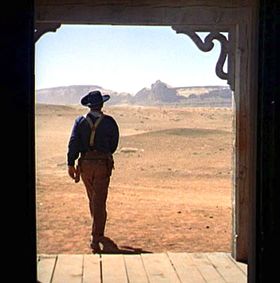 No one needs an excuse to revisit the “The Searchers.” Here’s one anyway: Warner’s newly restored and remastered version of the 1956 John Ford-John Wayne masterpiece finally brings home the film in an approximation of its original theatrical glory. Colors are remarkable, and images seem complete. Owners of previous versions should upgrade without hesitation.
No one needs an excuse to revisit the “The Searchers.” Here’s one anyway: Warner’s newly restored and remastered version of the 1956 John Ford-John Wayne masterpiece finally brings home the film in an approximation of its original theatrical glory. Colors are remarkable, and images seem complete. Owners of previous versions should upgrade without hesitation.
Any old “Searchers” DVDs are rendered obsolete, including Warner’s widespread and notorious 1997 release, which forced viewers to pick their poison: either a pan-and-scan crop job that stunted the film’s magnificent landscapes or a “widescreen” treatment that scalped the verticals.
Director Martin Scorsese, who counts “The Searchers” as one of his favorite films, insists that no contemporary home video or theatrical presentation can match his boyhood experience of watching “The Searchers” in its original VistaVision theatrical format.
“I (don’t have the words to) tell you what that VistaVision looked like projected,” he says of the long-gone system that yielded fine grains, endless depths of field and extra-wide images. “There’s nothing today that can equal that.” The cinematic poet and landscape artist Ford made the most of the format and Technicolor with endless longshots of his beloved Monument Valley.
Scorsese is joined by directors Curtis Hanson and John Milius in a half-hour appreciation of the film included as a DVD extra. All three dwell on the dark side of the film, which tells of an aging Civil War veteran and mercenary (Wayne) who stalks a Comanche warlord who slaughtered his brother’s family and made off with his niece (perhaps his daughter).
The film’s treacherous crosscurrents include rape, sexual slavery, the slaughter of innocents, Old Testament vengeance and omnipresent racism. Few films burrow so deep into the audience’s primal places. Even today, after viewing the restored film, Scorsese finds it “very disturbing.”
“The violence in the film is so dark and effective because we never see it,” Hanson says. “Questions of race run through every minute. We see the violence and racism of our society.” When Wayne looks down with disgust and hatred on white girls turned Comanche, “it’s like looking into the eyes of hell.”
Peter Bogdanovich, the dependable (and prolific) DVD commentator, says “The Searchers” is “as good a Western as Ford made, maybe the best.”
 “It’s amazing how it was overlooked in its day,” Bogdanovich says. “It was sort of dismissed (by the press) as another John Ford-John Wayne movie.” He adds, “Time is the best critic.” The film’s offspring are legion, of course, from Leone to Peckinpah to “Star Wars” to “The Proposition.”
“It’s amazing how it was overlooked in its day,” Bogdanovich says. “It was sort of dismissed (by the press) as another John Ford-John Wayne movie.” He adds, “Time is the best critic.” The film’s offspring are legion, of course, from Leone to Peckinpah to “Star Wars” to “The Proposition.”
“The Searchers” comes in two double-disc sets with identical content on the DVDs. The “Anniversary Edition” retails for $26.99. The “Ultimate Collector’s Edition” ($39.92) adds print materials, including reproductions of the 1956 tie-in comic and the original press book, along with some unremarkable memos and postcards.
New-to-DVD extra features are the Bogdanovich commentary, a needless introduction by Patrick Wayne and the excellent half-hour “An Appreciation.” Ported over from previous videos are the jittery Ken Burns-like docu “A Turning of the Earth” (Milius narrates) and a handful of “Behind the Cameras” TV puff pieces from 1956 with Gig Young.
The older extras lean on clips from the Ford crew’s filmed diary, an early stab at a serious making-of docu. Warner had no alternate takes or deleted scenes to display, typical of the efficient Ford, Bogdanovich says.
There is a good deal of repetitive material in the extras for the releases reviewed here — images, clips, stories — but most viewers won’t mind. Unfortunately, there’s nothing on the music in Ford’s films, such as Max Steiner’s score for “The Searchers.”



Leave a Reply